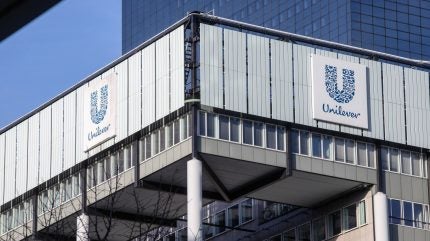
Unilever has announced its most ambitious climate targets yet. For the first time, the Marmite and Magnum maker has set an emissions-reduction plan including not only internal emissions (Scope 1 and 2) but near-term Scope 3 greenhouse gas (GHG) reduction targets.
Nevertheless, campaign groups are divided about whether the FMCG giant’s goals are concrete enough to translate into real impact.

Discover B2B Marketing That Performs
Combine business intelligence and editorial excellence to reach engaged professionals across 36 leading media platforms.
Unilever is aiming to reduce Scope 1 and 2 emissions by 100% by 2030 compared to 2015 and bring down its Scope 3 emissions by 39% by the same year compared to 2021. It also hopes to reach net zero fully by 2039 through reductions and eventually carbon removals. Notably, the company chooses not to use the increasingly controversial tool of carbon offsets to reduce its carbon footprint.
Many of its efforts to reduce Scope 1 and 2 emissions are standard fare: increased thermal and energy efficiency, transitioning to more renewable energy and increasing onsite electricity generation. Scope 3 reductions are notoriously much harder to mitigate as they require engagement with suppliers, which often entails asking much smaller companies to reduce their emissions. These emissions, crucially, are often the bulk of a multinational’s emissions.
How to hit net zero
Unilever intends to work with 300 of its most carbon-intensive suppliers to help them transition to lower-impact production methods. Part of those projects will involve “co-funding supplier access to expert support services, sharing best practice knowledge and industry examples to develop an emissions baseline, and providing assistance in setting GHG reduction targets and guidance in developing GHG reduction plans,” the company said in its new Climate Transition Plan.
It will also mean reformulating products, such as ensuring that its laundry detergent activates at lower wash temperatures, that its ice cream stays frozen at higher freezer temperatures and that the amount of high-emissions ingredients (such as palm oil) in its foods is reduced.

US Tariffs are shifting - will you react or anticipate?
Don’t let policy changes catch you off guard. Stay proactive with real-time data and expert analysis.
By GlobalDataThe company is committed to the plan. While the cost of reducing emissions is not known, the total cost of the green transition is expected to be around $100trn-$300trn between 2023 and 2050. Unilever’s 2023 revenue was around $64.5bn, so these costs could easily run into the hundreds of millions of dollars.
Additionally, GlobalData analysis of company filings shows ESG has been the most discussed theme for the company for the past three years, with environment and climate change remaining in the top five since 2016.
The shareholder problem
This current plan has the support of Unilever’s largest shareholders, an important move to address scepticism in recent years over the company’s “purpose-led” approach.
In 2022, investment group Fundsmith Equity accused the company of “losing the plot”, arguing the company was too focused on its ESG credentials.
The company’s share price is currently down almost 8% since March 2019 and over 10% down from its peak in September of the same year. In response to shareholder disgruntlement, CEO Hein Schumacher announced shortly after his appointment in July 2023 that the company would include sustainability in its KPIs, but that the company’s previous ESG efforts had left it “spread too thinly”.
Reaction to the plan
“While it is good that Unilever is updating and improving its climate and wider environmental goals, their plan seems to be riddled with massive blindspots," Nusa Urbancic, CEO of market-focused campaign group Changing Markets, tells Just Food.
“On the positive side, they are setting specific targets to increase low emissions and plant-based ingredients, which is a great strategy to cut the emissions from food products, but unfortunately, they stop short of setting any concrete goals on that.
“One crucial oversight in their plan is a lack of specific methane target or even a commitment to report methane emissions separately. As a large user of dairy, Unilever should be joining other companies in the sector, which have committed to reducing this extremely potent greenhouse gas.
“Finally, their plastic commitments lack teeth. They refuse to stop using very damaging sachets, which are a plastic pollution scourge, especially in Asian countries, and they also fail to express support for systemic solutions, such as deposit return systems, while their commitments to reuse remain extremely vague.”
Not all groups are as pessimistic, however. As You Sow, a shareholder advocacy non-profit focused on sustainability was impressed by the announcement, telling Just Food that it “is pleased to see the high degree of transparency and specificity in Unilever’s newly updated Climate Transition Action Plan. It appears to be designed to achieve 1.5°C-aligned reductions across its value chain and reach net zero emissions by 2039.
“This disclosure provides investors with the necessary information to understand both Unilever’s exposure to climate risk and the ambitious steps the company is taking to mitigate its contributions to climate change.”
It added: “The company’s achieved and future greenhouse gas emissions reductions position it to better compete with its peers, comply with climate-related regulations, and maximize the benefits associated with decarbonisation. Unilever has long been a leader in this space, and we will be following their progress as they take steps to turn these goals into action.”
Unilever itself was contacted to elaborate on some elements of the new plan but had nothing to add.
Investors and campaigners will be watching the company’s progress carefully.





